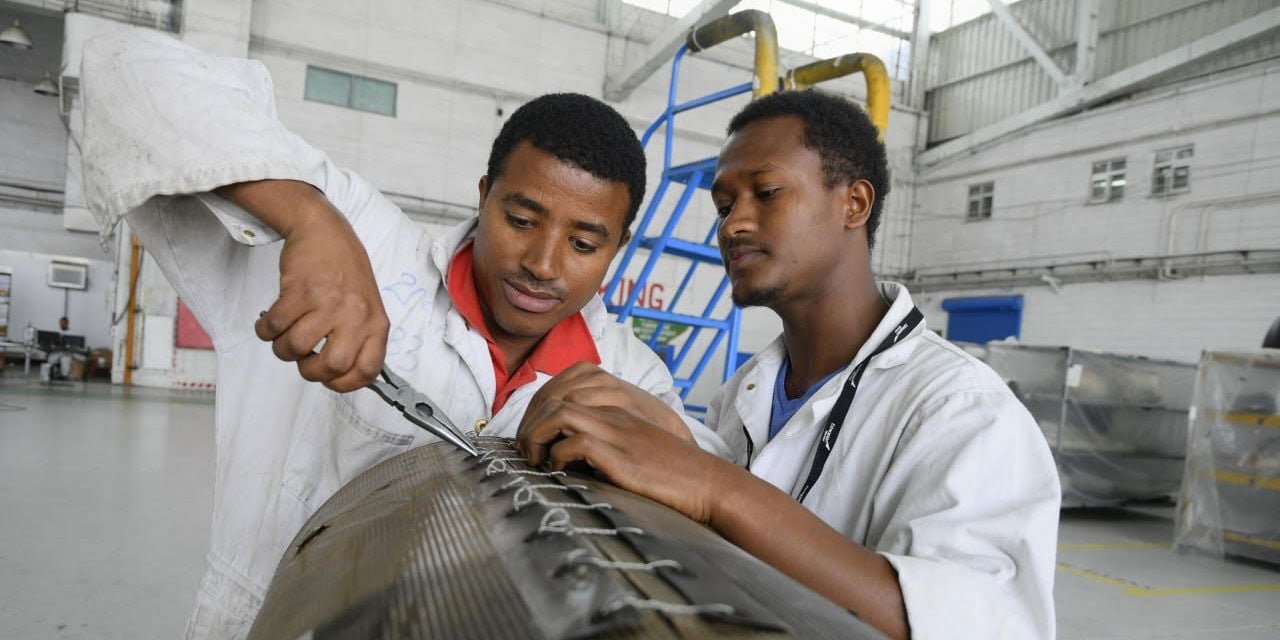Click Here to View This Page on Production Frontend
Click Here to Export Node Content
Click Here to View Printer-Friendly Version (Raw Backend)
Note: front-end display has links to styled print versions.
Content Node ID: 405712
A new partnership forged this past summer between Boeing (Stand 1200) and Ethiopian Airlines to create a so-called aviation hub in Africa appears to have borne early fruit for the flag carrier, as talks on producing and supplying insulation blankets for Boeing 737 Max narrowbodies have reached their final stages, according to the airline’s acting COO, Retta Melaku.
“We are on the final stage of the discussion to start production,” he said. “Currently we are discussing with Boeing plans to expand this capability to other newer models such as the 787.”
According to an August agreement to create an African “aviation hub” in Addis Ababa, Boeing and Ethiopian plan to partner in four areas of strategic collaboration—industrial development, advanced aviation training, educational partnership, and leadership development.
A Lasting Relationship
The relationship between Ethiopian Airlines and Boeing dates back to the inception of the flag carrier in 1945. At the time, the Ethiopian government hired TWA to establish and manage Ethiopian Airlines, which started operations in April 1946 with five World War II-surplus Douglas C-47 Skytrains.
When Ethiopian Airlines joined the jet age in the 1960s, it became the first African airline to acquire the four-engine Boeing 707 derivative called the 720. While Ethiopia underwent a socialist revolution in the 1970s, the national flag carrier placed orders for Boeing 727s. By 1984 Ethiopian became the second airline in the world to acquire the Boeing 767-200, after Israel’s El Al. Most recently, Ethiopian became one of the launch customers for the Boeing 787, becoming in 2012 the third airline to acquire the Dreamliner after ANA and Japan Airlines.

MRO Expertise
Established in 1957, Ethiopian MRO and Engineering Services boasts a rich history of maintaining and repairing Boeing aircraft. The MRO center has six modern maintenance hangars and engine, component, avionics, and mechanical shops. It also maintains De Havilland Q400s and Airbus A350s. The center provides maintenance services for airlines in most African countries and to major Gulf carriers Saudia and Oman Air.
As part of the growing relationship with Boeing, Ethiopian Airlines established a small aerospace manufacturing plant at its hub at the Addis Ababa Bole International Airport in 2009. The plant produces wire harness kits for Boeing and consistently scores high in quality rankings.
“Actually we are one of the best suppliers of Boeing,” said Melaku.
Every year Boeing evaluates its suppliers in terms of two key parameters—time of delivery and quality. “Only if you are scoring 100 percent on both parameters do they consider you a gold supplier and above 98 percent [for logistics and still 100 percent for quality] to be a silver one,” he explained. “Ethiopian has been able to meet those targets consistently and has received both gold and silver awards from Boeing.”
In 2017 Ethiopian agreed to expand its manufacturing capability, reaching a deal with Boeing to supply small panels and other various aircraft components. “This is the first step we took to establish an aerospace manufacturing industry with Boeing,” Melaku said.
An Aviation Hub
Ethiopian Airlines Group CEO Tewolde Gebremariam said the partnership expands Africa’s manufacturing capability in multiple fields. “I have firm conviction that with our dedication in its implementation, the MOU will successfully attain its goal of positioning Ethiopia as the continent's aviation hub,” he proclaimed.
Gebremariam said Ethiopian also will continue to work with key U.S. aviation companies such as Boeing, GE, and Collins Aerospace.
According to Melaku, the first of the four pillars on which the partnership with Boeing stands involves industrial development in Ethiopia. “We will work to establish different manufacturing sites just like the wire kit harness manufacturing plant,” he said.
The second pillar—namely advanced aviation training—centers on boosting the number of pilots, technicians, and engineers. The third, which focuses on educational partnership, calls for Ethiopian and Boeing to transform the Ethiopian Aviation Academy into a global standard aviation university that would serve the Africa and Middle East region.
The last pillar centers on leadership development. “In Africa, the biggest challenge is lack of qualified and competent leadership,” said Melaku. “In our partnership with Boeing, we anticipate developing the next generation leadership for African aviation industry.
“In addition to serving our valued passengers we believe that we should develop the aerospace industry and exploit the untapped potential of Africa and contribute to the rise of the African aviation industry on the global stage,” Melaku concluded.